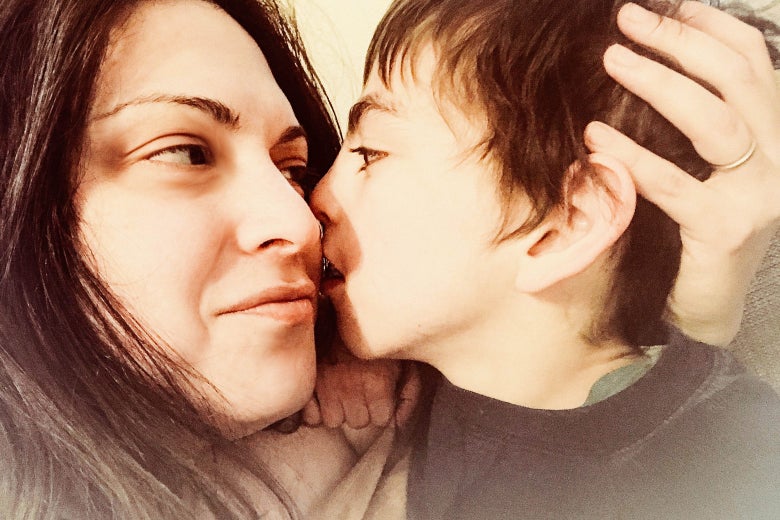Not Mine to Mold
Disabled people taught me so much about how best to love my son.
By ELIZABETH PICCIUTODEC 14, 20184:36 PM

When he was 4, I took my middle son, Edmund, to a feeding clinic for an evaluation. Edmund, now 9, was born with a rare genetic disorder called cri du chat syndrome. He has multiple intensive disabilities including nonverbal autism, and he uses a wheelchair. He had been fed via gastrostomy tube since birth and retched at the slightest taste of food. I worried about this. A lot. To be sure, the feeding tube had enabled him to thrive in spite of his health challenges. He had been barely responsive in the neonatal intensive care unit; by 4, he was a friendly preschooler who mashed his fists on toy pianos, delighting in his terrible music. But sharing a meal I’d prepared with friends and family was one of the great joys of my life. How could my child never experience that pleasure?
The feeding clinic informed me that Edmund would require an inpatient stay of at least six weeks. Each day, they’d make hundreds of attempts to feed him until he could accept food without gagging. Six weeks? I worked and had two other kids—even a one-hour daily visit would be rough. He was so affectionate; he never met a lap he didn’t like. I pictured him alone with no one to snuggle under a buzzing fluorescent light, wondering why he’d been abandoned. I pictured myself in his place, spending weeks alone, forced to repeatedly gag. I thanked them, left, and never returned. I wanted him to learn to eat, but I could not let him go through that.
At the time, I felt such guilt for failing to help him. Now, however, I’m so relieved we made that choice. What I’ve learned in the five years since then is that parenting Edmund boils down to one major issue: Do I want to change my son so he can fit into the world, or do I want to change the world so it accepts my son as he is? I have learned I should strive for the latter.
When Edmund was born, I was thrust into the unknown. The main advice my husband and I received was to seek out other parents of children with similar medical issues. This is, indeed, useful advice. We did, and it was absolutely helpful. Our new community provided a crucial sense of belonging and offered tips on everything from navigating education systems to choosing the best wheelchair. One of my closest friends is mother to a kid with cri du chat syndrome. I don’t know what I’d do without her.Do I want to change my son so he can fit into the world, or do I want to change the world so it accepts my son as he is?
But caring for an infant with disabilities was entirely different from caring for Edmund’s brothers. With them, I benefited from parenting knowledge handed down through generations, and I could draw from my own childhood experiences. I regularly observed parent/child dynamics in other families, and I absorbed endless parenting advice in conversation, magazines, and newspapers, not to mention fictional books, movies, and TV shows.
I had no such knowledge of how to parent a disabled child. I knew no disabled peers growing up; they didn’t attend my elementary school. We were at sea, as we were told Edmund would always be “profoundly disabled.” I was already overwhelmed, imagining a future centered entirely on caregiving, when a doctor in the NICU took us aside and suggested we institutionalize him. Clueless as I was, I felt this advice was outdated. But experts seemed to validate the worst voices in my head, the ones I was ashamed of: Let me go back in time. I didn’t sign up for this. I slowly realized that being a parent is signing up for this. Eventually, my husband and I sought advice from therapists and teachers, but even they didn’t have access to long-term data, just a few decades of small scientific studies.
When I finally turned to social media, I found that the recommendations I’d been given for how to care for Edmund were incomplete and ignored the crucial perspective of disabled adults. On Twitter, I connected with disabled people for the first time. I devoured their tweetstorms, blog posts, and articles. I started to learn about the experience of disability. Stella Young’s TED Talk on disability, with all her wry humor, made me rethink how disabled people are both sentimentalized and denied basic accommodations. By reading their perspectives, I saw Edmund in a whole new light.
I heard disabled adults argue that disabled kids need to learn agency and independence rather than compliance. They want to ensure that disabled people are accommodated and receive what they need to live their lives. Many disabled people don’t want to be cured; disability is frequently essential to their identities. This is even reflected in how most disabled people define themselves: They often prefer to be called “disabled people” because their disability is vital to their sense of self, whereas parents often say “people with disabilities” because they want to stress that their child’s disability doesn’t define them.
